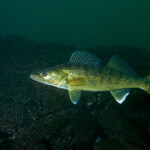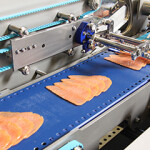10 nations to jointly study marine resources of the Arctic

A two-day conference of scientific experts from Russia, the United States, Canada, Denmark, Norway, South Korea, China, Sweden, Japan, and the European Union in the Russian city of Arkhangelsk resulted in an agreement to conduct more research on Arctic fisheries.
The April meeting was the first after an agreement between the 10 countries was signed in October of last year. The legally binding accord prohibits all commercial fishing in the Central Arctic until the nations additional surveys of stocks, their sizes, and how the region’s ecosystems operate. The agreement also included a draft of a joint research plan, with details to be discussed later this year and with implemented stalled until all the participating states ratify the agreement.
There is almost no data on high Arctic stocks, as nearly all the Arctic countries have only surveyed their own 200-mile exclusive economic zones. The only known study of the high seas was conducted by scientists from the Stockholm University. Its results presented at the conference brought some surprise and made it clear that more extensive research is needed, according to Vasily Sokolov, deputy head of the Russia’s Federal Agency for Fisheries.
“The Arctic Ocean was supposed to contain no great marine biological resources to be of interest for commercial fisheries. But it turned out that stocks of Arctic cod seem to be there, which means that fishing there may be commercially attractive,” Sokolov said. “The density of stocks increases toward the polar cap.”
Sokolov called for additional research, saying the initial Stockholm University assessment was conducted solely using acoustic surveys, without taking any samples.
Scientists have called for a data-sharing initiative on fish stocks in the high Arctic, spearheaded by a special international body that would communicate findings with the North-East Atlantic Fisheries Commision (NEAFC), the International Council for the Exploration of the Sea (ICES), and the North Pacific Marine Science Organization (PICES). The initiative would be charged with leading the development of a new methodology for collecting data, including such issues as fishing gear, process of survey, information exchange between the countries.
However, numerous obstacles remain before the research project gets underway.
“We don’t know now which vessels will be deployed in surveys. Another issue is how to verify data collected," Sokolov said, as quoted by TASS news agency.
In addition to the methodology issues, an additional hurdle must be overcome in that the plan must be formally ratified by all the countries involved. Currently, only Russia, which initiated the conference, has ratified the agreement. It may take one to two years for the other countries to ratify, which is likely to create delays in the joint surveying agreed to by the parties present at the conference.
“We hope all the participants will go through the ratification process soon to be able to conduct full scale research,” Sokolov said.
In the meantime, each country may perform surveys individually or within bilateral or multilateral cooperative agreements. Russia itself is pursuing studies in its own Arctic waters – in 2019, two scientific ships will explore the Bering Sea, the Sea of Laptev, the Chukchee Sea, the Barents Sea, the Kara Sea, and the East Siberian Sea to study their marine resources, environment, the availability of feed provision, size, and distribution of stocks. Scientists’ focus will be primarily on cod, Arctic cod, herring, halibut, flounder, opilio crab, candle fish, and navaga.






Share